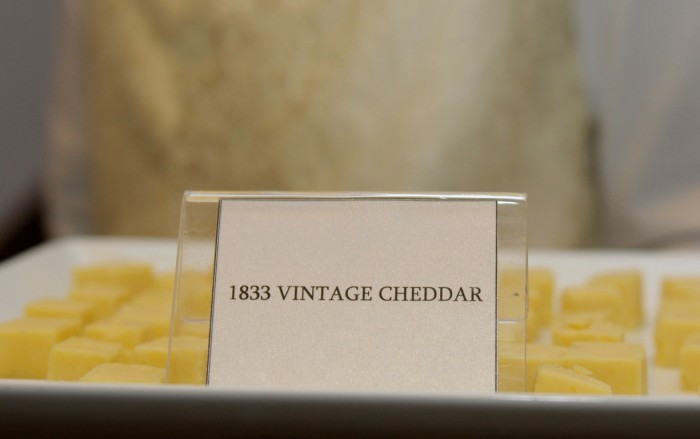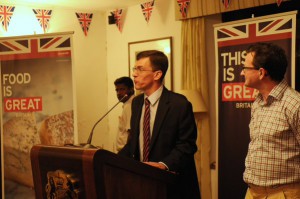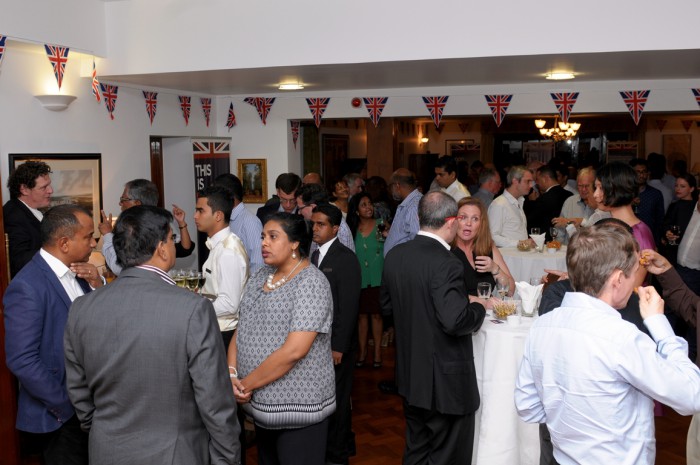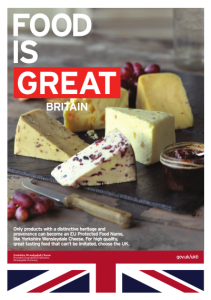21st January 2016 Colombo, Sri Lanka
Glorious British Cheeses in Colombo

 There are 700 named varieties of British cheese. On Monday night, at the High Commissioner’s Residence, we tasted four of these: a blue Stilton and a mature cheddar, two of the most famous British cheeses, as well as a Red Leicester and a white Stilton with mango and ginger.
There are 700 named varieties of British cheese. On Monday night, at the High Commissioner’s Residence, we tasted four of these: a blue Stilton and a mature cheddar, two of the most famous British cheeses, as well as a Red Leicester and a white Stilton with mango and ginger.
Cheddar is probably the most consumed cheese in the world. It is named after the Cheddar Gorge caves in Somerset, where the cheese used to be stored to ripen. Mature cheddar is still stored for a year or longer before it is ready to eat. Cheddar making in Somerset goes back more than 800 years: in 1170, King Henry II declared it the best cheese in the country, and bought 4.6 tonnes of it. During the reign of Charles 1 (1625 to 1649), parliamentary records show that cheddar was so highly prized that it was only available at the royal court.

Stilton is almost equally famous. Like many British cheeses, it has a protected designation of origin. Only seven dairies, all in the three counties of Derbyshire, Nottinghamshire and Leicestershire, are licensed to produce it. Those dairies produce over one million cheeses a year. Although most of this stays in the UK, 100,000 stiltons are exported every year to over 40 countries worldwide (even to France!). The strict rules about the origin and recipe for real stilton are typical of British cheese: every piece of cheese can be traced back to its dairy herd, if not its actual cow, of origin.
We also had a Red Leicester: its distinctive orange colour originated from the high concentration of cream in the milk. The UK is famous for its rain, rain makes for great grass, and great grass makes for happy cows and creamy milk! Around 300 years ago, though, farmers started intensifying the colour by using a vegetable dye called annatto, imported from South America and the Caribbean. International trade and delicious local cheeses have always been closely linked: today, the UK’s dairy exports are worth £900m a year, and rising.
Our last cheese illustrated the exceptional range and creativity and range of British cheese-making: a Stilton again, but a white one, with added ginger and mango. The combination of flavours could not have been more appropriate for an event celebrating British cheese in Sri Lanka.

The cheeses were all provided by Somerdale International Ltd, one of the UK’s leading exporters of cheese and dairy products, as part of a weeklong celebration of British food. This will culminate in a gala dinner at the Cinnamon Grand curated by Marco Pierre White. It also includes a special menu at the Grand’s Cheers Pub designed by Rob Kennedy, visiting Colombo from Sandhurst, the UK’s Royal Military Academy. Rob has cooked for HM The Queen five times, including the Sovereign’s Parade for the Royal Princes and the 2012 Royal Jubilee at Windsor Castle.
 These are all wonderful opportunities to showcase some of the best British meats, fish, cheeses and single malts. We want more Sri Lankan distributors to supply them, and more consumers to demand them. Food and drink is the UK’s biggest manufacturing sector, greater than cars and aerospace combined. British exports to Sri Lanka are up 47% year on year, and we want Great British Food to be a bigger part of that.
These are all wonderful opportunities to showcase some of the best British meats, fish, cheeses and single malts. We want more Sri Lankan distributors to supply them, and more consumers to demand them. Food and drink is the UK’s biggest manufacturing sector, greater than cars and aerospace combined. British exports to Sri Lanka are up 47% year on year, and we want Great British Food to be a bigger part of that.
So, how many varieties of British cheese have you tasted? And wouldn’t it be great if more of them were available in Sri Lanka?